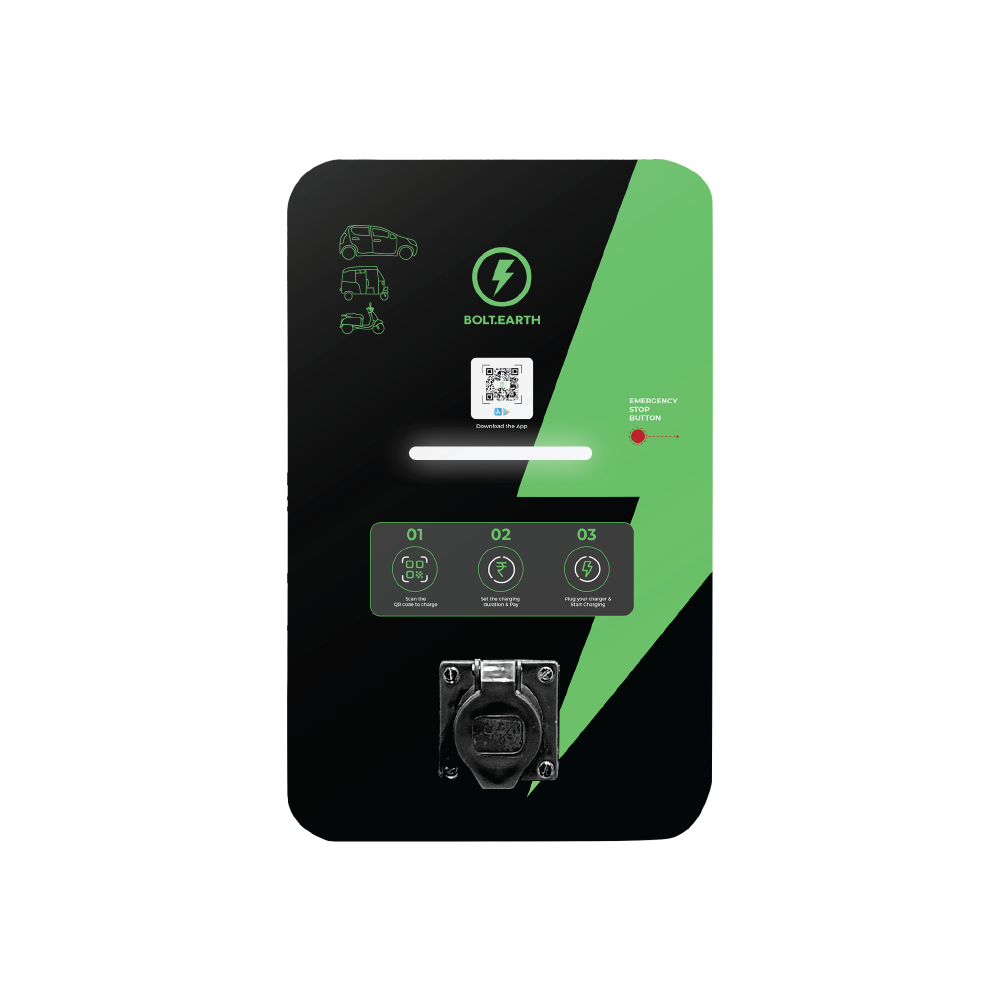How Public-Private Sector Collaboration Can Accelerate EV Adoption in India
Raghav Bharadwaj
Chief Executive Officer
Published on:
06 Sep, 2023
Updated on:
24 Nov, 2025

India has been experiencing a noticeable shift towards electric mobility. In FY 2024–25, over 1.3 million EVs were registered, representing a 78% year-on-year growth, which signals a major shift toward sustainable transportation. This surge is driven by India’s progressive EV policy, increased consumer awareness, and strategic public-private partnerships.
Despite this, challenges like charging infrastructure gaps, affordability, and consumer perception persist. Overcoming these obstacles will require a concentrated, unified effort from all stakeholders, especially between government bodies and private innovators.
This article delves into the transformative impact of public-private collaboration in the field of EVs. It answers the following questions:
- What role does public and private sector collaboration play in accelerating India’s transition to electric mobility?
- How can this collaboration address the challenges of transitioning to EVs?
- Why is public and private sector collaboration crucial for this transition?
The Current State of EVs in India
In FY 2024–25, India saw 1.3 million+ EV registrations, with two- and three-wheelers dominating the market. Notably, electric passenger vehicle registrations crossed 1 lakh units, showing an 18% growth over the previous year. This reflects growing consumer confidence and the impact of targeted incentives under the evolving EV policy in India.
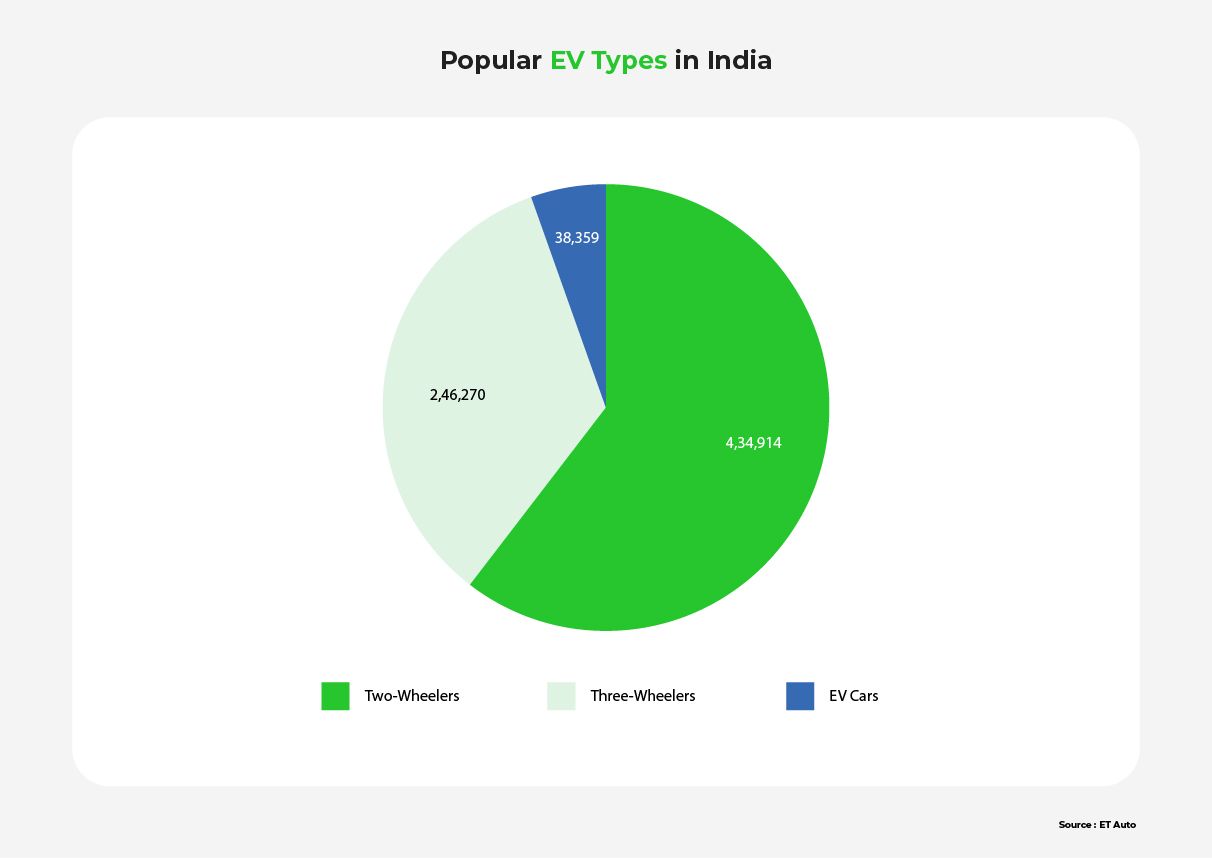
Government initiatives like FAME II, state-level subsidies, and reduced GST from 12% to 5% continue to drive adoption. Moreover, prominent automobile manufacturers and numerous EV startups are investing heavily in electric vehicle charging solutions tailored to Indian road conditions and improving the driving experience.
Charging infrastructure providers and software developers are collaborating to expand EV charging for businesses, especially in commercial hubs and fleet operations. Above all, the private sector is working closely with government agencies to tackle key challenges and accelerate EV growth and adoption.
The Importance of Public and Private Sector Collaboration
The symbiotic relationship between the public and private sectors is crucial in maintaining the growth of EV adoption. This collaboration is a mix of expertise and the right resources. The private sector, composed of leading EV manufacturers, technology developers, and market leaders, offers cutting-edge EV designs, robust distribution, and myth-busting marketing.
In contrast, the public sector, with its significant influence via subsidies and incentives, is a crucial ally for the success of the private sector. Policymakers and various government departments create the regulatory framework and policies that incentivize EV adoption. Financial incentives like subsidies, low-interest loans, and tax benefits create a conducive environment for the private sector. Together, they share risks, pool resources, and accelerate innovation, driving electric mobility growth in India.
Challenges to EV Transition
Despite considerable progress in India’s EV journey, many challenges continue to hamper widespread adoption. Notably, the lack of infrastructure, the cost disparity between EVs and conventional vehicles, and consumer awareness and perception continue to pose challenges facing this industry. A siloed approach, where public and private sectors operate independently, exacerbates these challenges and undermines the efforts required to address them.
Charging Infrastructure Roadblocks
India has approx. 25,000 public charging stations, a leap from 2023, but still behind global benchmarks. Most are concentrated in metros, creating range anxiety. In comparison, the global average is one station for every 20 vehicles. Moreover, these charging stations are primarily located in the metropolitan areas of Delhi, Mumbai, and Bengaluru, creating range anxiety for drivers traveling long distances.
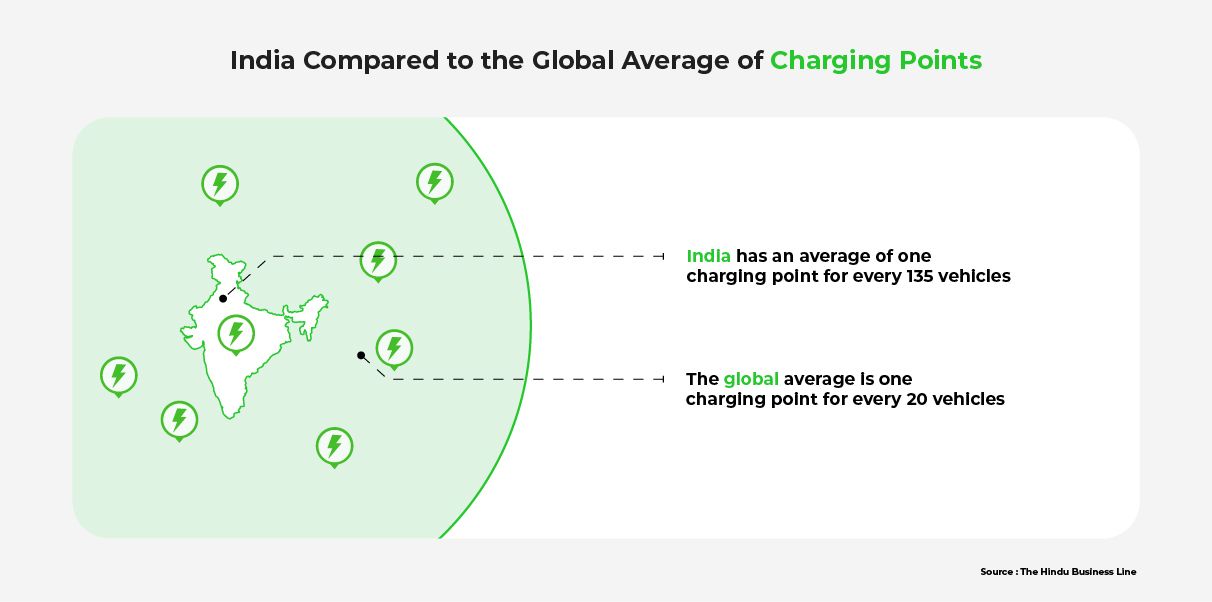
A public-private partnership (PPP) could accelerate the expansion of charging infrastructure in India, alleviate range anxiety, encourage long-distance travel, and open new possibilities for EV adoption. Public-private partnerships (PPPs) can expand coverage, especially for EV charging for businesses in Tier 2/3 cities.
Affordability Concerns
In India’s price-conscious and value-driven car market, EVs come at a significantly higher cost than traditional internal combustion engine (ICE) vehicles. These factors contribute to low adoption rates in the four-wheel segment.
Given that batteries account for 40% of the manufacturing costs, a PPP can foster innovation to improve battery energy efficiency, thereby reducing production costs. Such collaborations can make EVs accessible and appealing to Indian EV buyers.
Consumer Awareness and Perception
EVs are a relatively novel concept, and there’s a lack of adequate awareness and knowledge about their use. This has led to misconceptions and myths, which can discourage EV purchases.
Public and private sectors can design effective educational initiatives that dispel myths and inspire confidence in EVs. These measures can empower consumers with knowledge, dispel misconceptions, and foster enthusiasm for EVs, making them a preferred choice when it comes to vehicle buying decisions.
Lack of Adequate Technological Tools
The push for EV adoption requires interoperable technological components. India’s diverse market, with its unique demands, highlights the need for software solutions that seamlessly integrate various EV systems. Fortunately, Indian startups are at the forefront, innovating electric vehicle charging solutions to bridge these disparities. Their efforts are pivotal in reshaping public perceptions and making EVs more user-friendly.
Strategies and Solutions for Collaborative EV Transition
Considering the challenges mentioned above, the public and private sectors can jointly take some specific steps to ensure greater EV adoption.
Investments in Charging Infrastructure
The high costs of establishing EV charging infrastructure are a significant entry barrier, resulting in high range anxiety. Some measures to address them are:
- Joint investments from the public and private sectors in building charging stations can distribute the cost burden and risks.
- Partnerships between utility companies and charging infrastructure providers can ensure smart grid integration.
- Introduction of attractive financing options such as low-interest loans, tax subsidies, and more.
- Creation of joint consortiums to pool expertise and reduce maintenance costs.
Policy and Regulatory Framework
A collaborative policy and regulatory framework is the cornerstone for EV adoption as it establishes a stable and resilient environment that benefits all stakeholders. Some specific actions in this regard are:
- Creation of comprehensive policies that address the concerns of all stakeholders.
- Regular public-private interactions can streamline the permitting and approval processes, which can expedite action.
- Building a comprehensive renewable energy policy for EVs to ensure long-term sustainability and greater environmental benefits.
- Development of standards and certifications for EVs and charging infrastructure.
Research and Development Collaborations
Public and private sectors can undertake various research and development initiatives that can lower the manufacturing costs of EVs, improve battery technology, and create a sustainable EV ecosystem. Some possible actions are:
- Joint research projects between academic institutions, industry players, and government research agencies to accelerate EV technology development.
- Combined innovation programs to develop advanced battery technologies, electric drivetrains, and lightweight materials for EVs.
- Cooperative initiatives for advancing indigenous EV technologies, decreasing dependence on imports and foreign supply chains.
- Public-private partnerships are designed for pre-competitive research, enabling the sharing of resources and knowledge to overcome technological barriers.
Skill Development Programs
India’s EV industry is projected to generate one crore direct jobs and about five crore indirect jobs by 2030. However, the gap in skills could prevent India’s young workforce from capitalizing on this opportunity. The public and private sectors can reduce this gap with the following actions:
- Governments and the private sector should jointly develop EV-specific training programs and curriculum.
- Investment in upskilling the existing workforce in the EV industry.
- Build credible education technology (edutech) platforms offering online training and certification.
- Collaborate with educational institutions to provide apprenticeship programs.
It is encouraging to note that such collaborations have already begun, contributing to India’s rapid EV adoption.
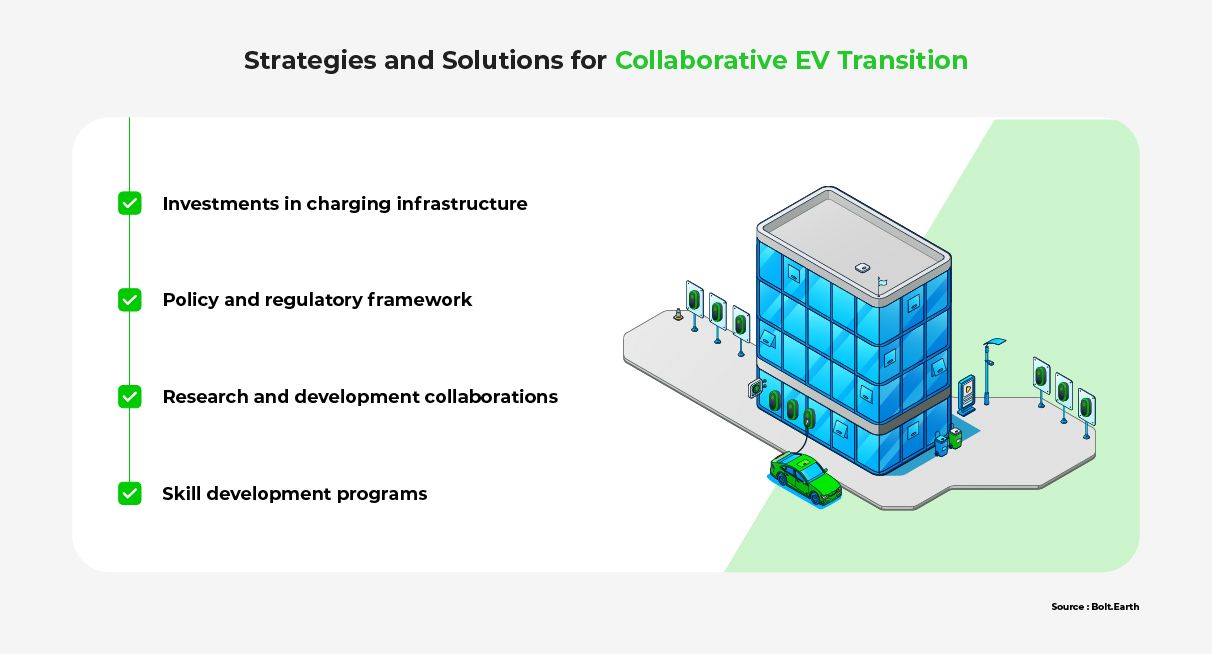
Successful Case Studies of Public and Private Sector Collaboration
Various stakeholders in India’s EV industry are working together, and the current rapid adoption is a testament to these joint efforts. Below are three successful collaborations.
Ather Energy and Karnataka Government
Ather Energy, a prominent Indian electric scooter manufacturer, has partnered with the Karnataka Government to set up 1,000 fast-charging points across the state. These stations will be established in public areas owned by the government or its subsidiaries, with state-owned power distribution company BESCOM providing support and implementation as per the Memorandum of Understanding (MoU). This partnership is designed to alleviate range anxiety and encourage EV adoption in Karnataka.
Hyundai and Indian Institute of Technology (IIT) Delhi
Renowned car manufacturer Hyundai entered a significant collaboration with the Indian Institute of Technology (IIT) Delhi to advance EV technology. The joint venture includes research and development projects aimed at improving EV technology, battery efficiency, and range capabilities. Hyundai has donated its Kona EV for battery profiling using external sensors and OBD connectors, which help understand EV performance under varying driving conditions.
MG Motor and Tata Power
MG Motor and Tata Power combined efforts to establish an extensive fast-charging network across India’s major cities. With MG Motor’s commitment to environmentally friendly vehicles and Tata Power’s expertise in supplying charging infrastructure, this partnership addresses range anxiety and instills confidence in EV owners for long-distance travel.
These partnerships demonstrate the potential for society to leverage the environmental and economic benefits of EVs.
The Sustainable Impact of Collaboration on EV Transition
The collaboration between the public and private sectors has a far-reaching and varied impact. It can accelerate EV adoption and reduce carbon emissions, improving air quality. Additionally, such partnerships can encourage the use of renewable energy, promoting a cleaner and more sustainable transportation ecosystem.
Beyond the environmental benefits, collaborative efforts in the EV industry also create substantial economic opportunities. The growth of the EV industry boosts job creation across various sectors, including manufacturing, research, development, and maintenance of EVs and charging infrastructure. As India emerges as a global leader in electric mobility through joint initiatives, it attracts investments from domestic and international entities. This investment influx fosters innovation and technological advancements, furthering India’s expertise in EVs and related technologies.
Additionally, a robust EV ecosystem enables India to export its indigenous EV technologies, marking its position as a key player in the global electric mobility market. Therefore, the sustainable impact of collaboration on India’s EV transition is beneficial for the environment and drives economic growth, energy security, and global recognition.
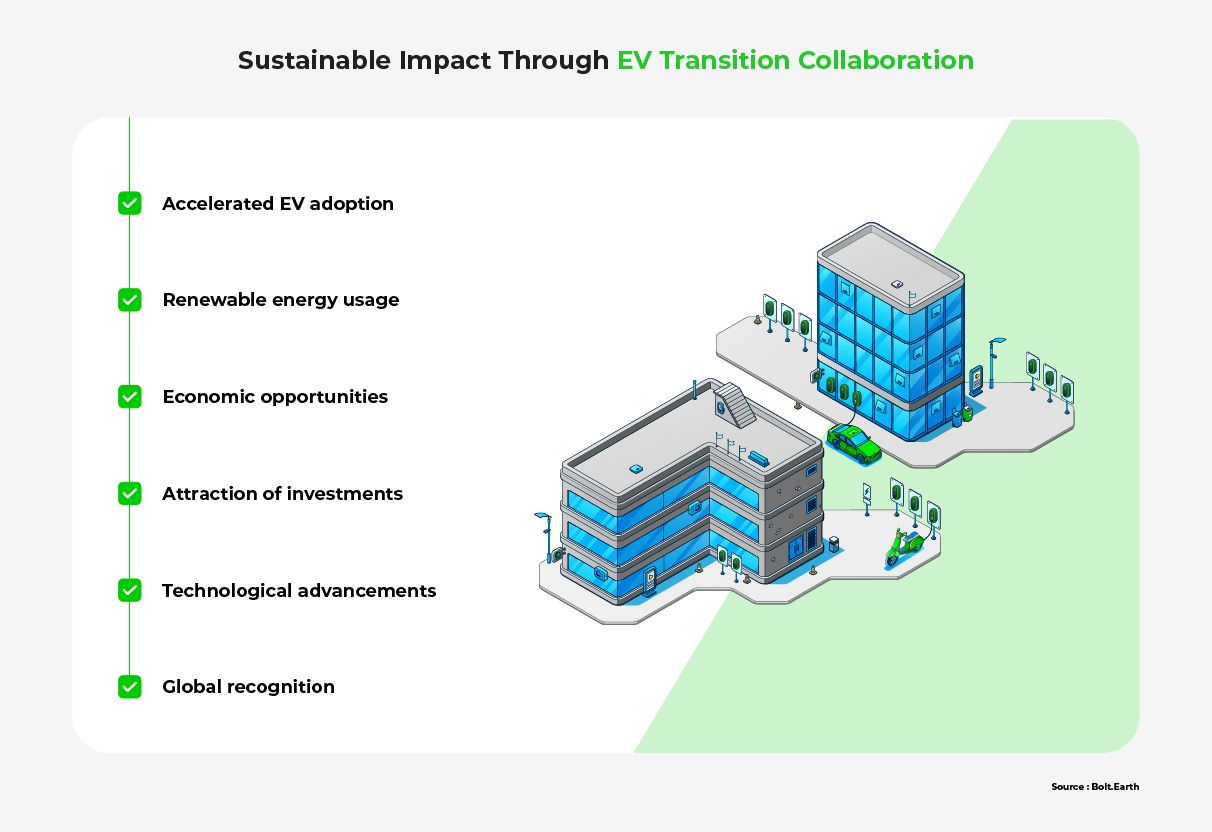
Driving EV Transition Through Collaboration
Collaboration between the public and private sectors is critical for accelerating India’s EV transition. Successful partnerships, like those between Ather Energy and the Karnataka Government, Hyundai and IIT Delhi, and MG Motor and Tata Power, have proven a significant impact in overcoming challenges and driving sustainable growth in the EV industry.
To fully capitalize on the potential of electric mobility, more collaborations are urgently needed. Various stakeholders can form strategic partnerships to effectively address key roadblocks such as charging infrastructure expansion, affordability concerns, consumer awareness, and technological advancements. Through united efforts, the public and private sectors can establish an enabling environment that supports widespread EV adoption and paves the way for a cleaner, greener future.
All stakeholders must collaborate to bring about a transformative transition. Together, through cooperation, India can steer towards a sustainable future, reduce carbon emissions, improve air quality, and embrace electric mobility as a cornerstone of a cleaner, more responsible transportation landscape.

Frequently Asked Questions
What is the current status of electric vehicle adoption in India?
EV adoption in India is on the rise, 1.3 million+ units in FY 2024–25. This growth is due to growing awareness, government incentives, and a wider range of available EV models, and expanded charging infrastructure. Collaborations between the public and private sectors are crucial, particularly in strengthening charging infrastructure and overcoming the barriers to adoption.
Can collaboration between the public and private sectors accelerate the transition to EVs?
Yes. Joint efforts expand infrastructure, reduce costs, and build consumer trust. Through their combined expertise, resources, and influence, the public and private sectors can address major challenges hindering adoption.
What are the incentives and policies promoting the adoption of electric vehicles in India?
The central government in India has implemented various policies to boost the construction of EV charging stations, the use of renewable energy sources, and the purchase of EVs with low-cost financing options. State governments also offer subsidies and tax benefits to individuals and automobile manufacturers. Furthermore, many state governments are forming partnerships to address the existing challenges in EV adoption.
How does the collaboration of public and private sectors contribute to sustainable mobility and environmental benefits?
Joint initiatives between the public and private sectors aid in building charging infrastructure, crafting policies, and providing financial incentives that promote EV adoption. The private sector’s innovation in EV manufacturing and technology complements the public sector’s role in creating supportive policies and regulations. Together, they accelerate the EV transition, allowing all stakeholders to enjoy the environmental and economic benefits.

Feb 19, 2026 • EV Charging Infrastructure
EV Charging for Quick Commerce Fleets in India: Scaling Sustainable Delivery
Read More
Feb 17, 2026 • EV Charging Infrastructure
The Psychology of EV Charging: What EV Drivers Want at a Charging Station
Read More
Feb 12, 2026 • EV Charging Infrastructure
What Is the Real Bottleneck in Scaling India’s EV Charging Network?
Read More

